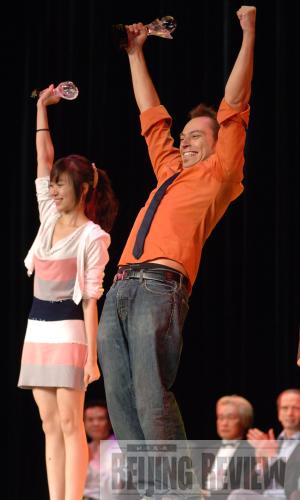|
"Most magicians, however, are a combination of the three and make it hard for us to define them, just like actors who always challenge themselves with different roles," he told Beijing Youth Daily.
The secret to a stunning magic performance is putting into control "the interactive monologue" through your facial expressions and body gestures, or allowing the audiences to be "the mind-readers" who understand totally what's going on in the magic performer's mind, he said.
"While watching you, the audience can sense whether you can control the situation, whether you are relaxed, and that's why the performer has to decide before the show whether he wants to be more of a killer, a victim or a witness," he said.
The art of magic
Magic performances are in principle similar, but performers' creativity and presentation style that demand knowledge of the stage, dance, hosting, chemistry, physics, and even mathematics, make them different.
Compared with foreign magicians, Chinese magicians focus more on techniques and skills rather than on the content, the special effects on the stage, or the presentation style. Also, as Eswin pointed out, close-up performances are yet to be improved in China, compared with stage magic.
Chinese magicians in general lack innovations in magic presentation while unique creativity and humorous presentation are the selling points of their Western peers, said Zhang Chao, a contestant from Jinan Acrobatic Troupe in Shandong Province.
Through the five-day observation of foreign magicians, Zhang believed Chinese magicians were on a par with them in terms of hand manipulations, techniques and complexity of performances, but not in terms of creativity and presentation effects.
"Magic is no longer conjuring, and magic performances today are focused more on presentation of special effects through borrowing elements from other art forms such as street dance and comedy," he said. "We have to update our understanding of magic and attempt innovations in every aspect of magic, from costumes, props to presentation style."
Deng Baojin, Director of Jinan Acrobatic Troupe, said he got a lot of inspiration from the competitions as well as the ideas of many from the appraisal committee members of the championships who had written books or shot films on magic.
"No one can survive with only one or two tricks, or follow the traditional stereotype of a certain performance, because audiences are always expecting surprises and changes, " Deng said.
The magic business
Like pop music and movies, magic in many Western countries has formed a complete industry. Most of magicians overseas turn to their own brokers for professional services such as fundraising, marketing, research and promotion.
"Such kind of services are not what we can find or offer in China at present," Deng said. A lack of funds and performance venues has impeded magic from prospering in China, he added.
"Without money, we cannot give performances that are actually a comprehensive presentation of audio and visual effects," he said.
Also Chinese magicians lack venues for regular performances. The Jinan Acrobatic Troupe invested 600,000 yuan ($87,848) to develop a magician team in 1999. The team launched a magic of stage illusions and had to give it up two years later because they could not find a venue for regular performances, according to Deng.
However, with growing interest in magic from China's general public, Deng expects the difficult situation to change soon.
Taiwan magician Louis Liu performed close-up magic in China Central Television's 2009 Spring Festival Gala and brought back the popularity of magic on the mainland. China has since then witnessed a fever of learning this art, and magic-themed TV programs have had high audience ratings nationwide.
Even so, the magic market in China is yet to mature, as audiences still need to develop an appreciation for magic performances.
They usually focus on the results and the secrets behind the magic, rather than the performance itself, Wang Zhiwei, Vice President of Beijing Magic Club, told China Radio International.
"The audiences do not know how to enjoy the humor, the wonders within, and the process of the magic," Wang said.
"Magic is not something to test your wisdom," said the world-renowned master illusionist David Copperfield during his China tour in 2002. When Chinese audiences begin to understand this the future of this art could indeed reach a place of magic.
 |
|
YOUNG AND PROMISING: China's 16-year-old Ma Yanyan (left), the youngest competitor of this year's championships, wins the second prize for general magic, and Hungarian magician Soma wins the gold medal for the stage competition (LI XUESHI) |
| 